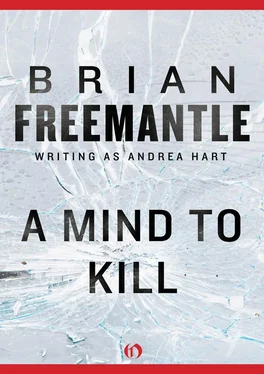Brian Freemantle - A Mind to Kill
Здесь есть возможность читать онлайн «Brian Freemantle - A Mind to Kill» весь текст электронной книги совершенно бесплатно (целиком полную версию без сокращений). В некоторых случаях можно слушать аудио, скачать через торрент в формате fb2 и присутствует краткое содержание. Жанр: Триллер, на английском языке. Описание произведения, (предисловие) а так же отзывы посетителей доступны на портале библиотеки ЛибКат.
- Название:A Mind to Kill
- Автор:
- Жанр:
- Год:неизвестен
- ISBN:нет данных
- Рейтинг книги:3 / 5. Голосов: 1
-
Избранное:Добавить в избранное
- Отзывы:
-
Ваша оценка:
- 60
- 1
- 2
- 3
- 4
- 5
A Mind to Kill: краткое содержание, описание и аннотация
Предлагаем к чтению аннотацию, описание, краткое содержание или предисловие (зависит от того, что написал сам автор книги «A Mind to Kill»). Если вы не нашли необходимую информацию о книге — напишите в комментариях, мы постараемся отыскать её.
A Mind to Kill — читать онлайн бесплатно полную книгу (весь текст) целиком
Ниже представлен текст книги, разбитый по страницам. Система сохранения места последней прочитанной страницы, позволяет с удобством читать онлайн бесплатно книгу «A Mind to Kill», без необходимости каждый раз заново искать на чём Вы остановились. Поставьте закладку, и сможете в любой момент перейти на страницу, на которой закончили чтение.
Интервал:
Закладка:
A Mind to Kill
Brian Freemantle
Chapter One
Jennifer had never imagined in her wildest dreams that she could be this happy.
It went way beyond happiness. It wouldn’t have made sense to anyone if she’d tried to put it into words, because there weren’t words to express properly how she felt. The best she could do to describe it, and only to herself, was as a total completeness. Everything was complete. Her perfect life and her perfect marriage to a perfect husband and the most beautiful, most perfect baby in the world, all absolutely and totally complete. And secure, as if there was a wall between her and everyone else to keep out anything bad, as high and as protective as the wall encircling the mansion she’d just left.
Jennifer sometimes became frightened, like she was unsettled by the reflection now, although it was something else she never tried to explain to anyone, not wanting to be laughed at.
Her fear was that she – anyone – didn’t have the right to be as lucky as she was, so secure, so sure of everything and everybody. Of herself.
That feeling was easier to rationalize than the overwhelming happiness. It was, she knew, a guilt she’d never ever be able to lose absolutely. She’d read all the newspaper reports and gone through everything with Gerald – so many times he’d grown angry and wouldn’t talk about it any more – before finally accepting there was nothing to reproach herself for. So it wasn’t that. It was the even earlier unease.
It had been there from the very start of the affair, the first night even, long before she’d ever fallen in love with Gerald and realized that it wasn’t simply an affair after all. The moment, in fact, she’d decided she’d been stupid to become involved with a married man and that everything was going to end in the mess it had.
Not, of course, the tragedy that had actually occurred. And from which she’d emerged unscathed and uncriticized to her own very special, locked-away happiness. A happiness she still found hard to believe she deserved. Soon after the tragedy she had considered seeking psychiatric help, unable to accept Gerald’s assurances by themselves, anxious for an unbiased, unemotional opinion.
But she hadn’t. And now Jennifer was glad. She’d never found it easy – virtually impossible in fact – to talk about personal, intimate things even to people close to her; even to Gerald. The thought of exposing herself to a stranger, mentally stripping herself naked, had stopped her then and now it made her physically shudder just to think about it as she came to the turn off to the kindergarten.
Jennifer had to wait because of the traffic congestion on the London road, smiling at another thought. She guessed a psychiatrist would judge how she chose to lead a lot of her life now as that of someone seeking atonement. She had immersed herself in charities and contributed substantially to every appeal and fund-raising approach made to her. The charity thought reminded her that for the rest of the month – maybe longer – she probably wouldn’t be able to collect Emily so regularly. Virtually everything was set up for the AIDS ball at Grosvenor House but Jennifer gave minute attention to every detail of anything she did or organized, seeking confirmation of confirmation, a habit she’d developed as the leading trader in Gerald’s company before their marriage. Now she didn’t trade any more – another lingering although very secret regret – she’d transferred her never-lose determination to another activity, to the benefit of people not as fortunate as herself. And there was still one item, the most important, not absolutely guaranteed. A lot of the intended success of the ball depended upon final confirmation of the Royal promise to attend. She’d give it another day or two before approaching the palace again.
What she did so well wasn’t atonement, Jennifer knew. She had nothing to atone for. When her other commitments allowed she collected Emily herself, instead of delegating to the nanny, because she adored the child and wanted her always to feel as safe as she did. She contributed to fund-raising because Gerald could more than afford it and she organized charity events superbly well because it was a practical and worthwhile way of occupying her mind as well as passing on just a little of the good fortune she’d never believed it possible to have.
Jennifer managed the turn at last, hurrying the final few hundred metres when she saw some children already-being bundled into cars.
Miss Singleton formed a physical barrier at the kindergarten entrance, not releasing any child until she recognized the parent or the nanny. The teacher beckoned Emily forward at Jennifer’s arrival and announced, ‘She’s been a very clever girl today.’
Emily proudly held up the postcard of a cow and Jennifer entered into the solemnity of the moment, taking her time to read the handwritten declaration on the back that it had been awarded to Emily Lomax for recognizing the letter C.
‘Wonderful!’ Jennifer enthused. ‘I’m very proud of you.’
‘Will Daddy be?’
‘I know he will.’ They began to return to the car, Emily automatically reaching up for Jennifer’s hand, waving with the other to various children who called to her.
‘I’ve got a card in my bag. Sally’s having a party next week. Can I go?’
‘Of course.’
‘She’s four, like me.’
‘But you were four three months ago.’
‘Does that matter?’
Jennifer laughed. ‘No.’
‘She wants a dog. A real one.’
Jennifer carefully secured the child into the rear-facing safety seat, brushing the bundle of curls from her forehead and kissing her. ‘Maybe if she’s a good girl she’ll get one.’
‘She doesn’t know what C means yet.’
‘Perhaps she will by the time her birthday comes.’
‘Why must I look backwards! I can’t see you like this.’
‘This way’s safer.’
‘No-one else in my class has to sit like this.’
‘If there’s an accident, you won’t get hurt.’ Although the gap was sufficient Jennifer waited until an approaching van passed before pulling out.
‘Is there going to be an accident?’
‘No.’
‘Never?’
‘Never,’ promised Jennifer.
‘Why can’t I sit the other way then?’
Jennifer smiled. ‘I think you’re going to be a lawyer when you grow up.’
‘What’s a lawyer?’
‘A very clever person.’
‘Cleverer than Daddy?’
‘No-one’s cleverer than Daddy.’
‘What are we doing after lunch?’
‘What would you like to do?’
‘Go to Marwell zoo and see the animals.’
‘Then that’s what we’ll do.’
Jennifer was late triggering the remote control as she came off the London road and had to wait for the high security gates to open fully before she could start up the drive. It was several moments before the square Georgian house became visible, through the trees.
Annabelle was waiting, just inside the entrance.
‘I’ve got a prize,’ announced Emily, producing the postcard. ‘For knowing what C is.’
‘What is it?’ asked the nanny.
‘Cow,’ declared the child.
‘Well done!’ praised the girl.
‘We’re going to Marwell this afternoon as a reward,’ said Jennifer, as they walked down the corridor towards the rear kitchen.
‘ We’ve got a long way to go. We’d better hurry,’ said Jane. ‘ I’ve waited so long, almost seven years, for you to feel as happy and as content as this. Oh, don’t forget the knife: we mustn’t forget that. ’
Chapter Two
The office had gained architectural awards and the City nickname of The Goldfish Bowl, to which Gerald Lomax, proud of their aggressive commodity record, added ‘for piranha fish.’ Built literally on the rubble of one of the IRA’s worst City bombings that totally destroyed the original building in which Jennifer had worked, it was a glass-walled expanse bare except for banks of computer stations. Lomax’s office was suspended above it against an inner wall, the side overlooking the trading floor also glassed from carpet to ceiling. So was the corridor from the elevator to Lomax’s eyrie.
Читать дальшеИнтервал:
Закладка:
Похожие книги на «A Mind to Kill»
Представляем Вашему вниманию похожие книги на «A Mind to Kill» списком для выбора. Мы отобрали схожую по названию и смыслу литературу в надежде предоставить читателям больше вариантов отыскать новые, интересные, ещё непрочитанные произведения.
Обсуждение, отзывы о книге «A Mind to Kill» и просто собственные мнения читателей. Оставьте ваши комментарии, напишите, что Вы думаете о произведении, его смысле или главных героях. Укажите что конкретно понравилось, а что нет, и почему Вы так считаете.












